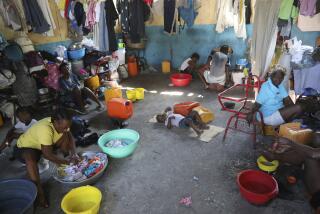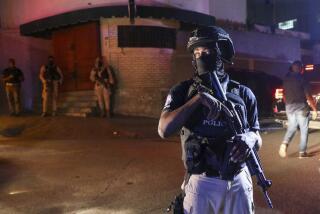Haitian Migration Linked to Violence, Poverty
- Share via
MIAMI — The rescue of nearly 300 weak, shipwrecked Haitian migrants from an inhospitable Bahamian cay--and the deaths of at least two others--brought into sharp relief Friday the deepening anarchy and economic decay in the impoverished Caribbean land they had fled.
On a day when Haiti’s political opposition reported another political slaying in advance of national elections scheduled for next month, most analysts linked the latest wave of illegal migration to the violence and despair in the country.
The refugees’ flight also was clear evidence, the analysts said, of how little has changed in Haiti since an exodus of tens of thousands of Haitians triggered a $2.3-billion, U.S.-led military intervention in 1994 to restore democracy there.
U.S. Border Patrol, Coast Guard and Bahamian officials said the more than 600 Haitians who have come ashore from the Bahamas to Florida in the past week also testify to a booming human smuggling trade that is further encouraging the precarious journey through hidden reefs and dangerous seas to the United States.
Coast Guard officials who helped rescue the 288 Haitians on Thursday from the Bahamas’ Flamingo Cay said their abandoned boat had all the trappings of a smugglers’ vessel run aground. At least two migrants--and possibly as many as 14--died from exposure and dehydration.
In addition, 31 Haitians detained early Friday as they darted from the beach in the sleepy Florida town of Hillsboro near the Broward-Palm Beach county line told agents that they had paid $1,500 each for the journey from the Bahamas--a key way station on the sea route between northern Haiti and South Florida.
Fifteen other Haitians detained in Key Biscayne on Thursday said they had paid $4,000 for the trip on a modern speedboat outfitted with twin 200-horsepower engines.
“These smugglers are utterly unscrupulous,” Border Patrol spokesman Joe Mellia said in Miami on Friday. “And their numbers do appear to be growing.”
He said the Border Patrol has detained 51 Haitians on the South Florida coast this month alone; last year, no one was arrested in all of April. And last month, the agency apprehended 76 Haitians, more than double the 36 it detained the previous March.
Last month also marked the beginning of major political violence in Haiti, where nearly a dozen candidates and local party leaders--mostly opposition figures--have been slain during the ongoing parliamentary and municipal campaigns.
Haiti has been without a legislature since President Rene Preval dissolved Parliament 16 months ago and began ruling by decree. Preval, who was elected to succeed Jean-Bertrand Aristide in 1996, has postponed elections several times this year.
Preval finally agreed two weeks ago to hold the two rounds of voting May 21 and June 25. But on Thursday, the president of Haiti’s independent Provisional Electoral Council warned that no vote would take place if the violence continued.
On Friday, associates reported that unknown attackers used machetes to hack and behead Ducertain Armand, a 70-year-old campaign director for the opposition Haitian Christian Democratic Party, on Tuesday in a small town about 15 miles from the capital, Port-au-Prince.
Ira Kurzban, a Miami immigration lawyer who represents the Haitian government, asserted that the latest migrant wave is unrelated to political strife in the country.
“These are not under any circumstances people fleeing Haiti for political reasons. These are people looking for a better life in the U.S.,” Kurzban said, blaming the nation’s disastrous economy on a cutoff of international aid.
But most U.S. and international aid--several hundred million dollars’ worth--has been frozen because Haiti has no legislature to earmark it, and most analysts lay the blame for the refugee wave on the nation’s political paralysis.
One Western diplomat who asked not to be identified provided a historical context in a nation where most former leaders are either dead or in self-exile--an option that Aristide had chosen before he was returned to power in the U.S. intervention.
With Haiti’s local currency in free fall, the diplomat noted: “The people’s mood oscillates from dejection to discouragement to rage and mobilization. . . . If Haitian history can serve as guide, the next step in the well-rehearsed scenario would be for President Preval to flee the country himself.”
More to Read
Sign up for Essential California
The most important California stories and recommendations in your inbox every morning.
You may occasionally receive promotional content from the Los Angeles Times.













